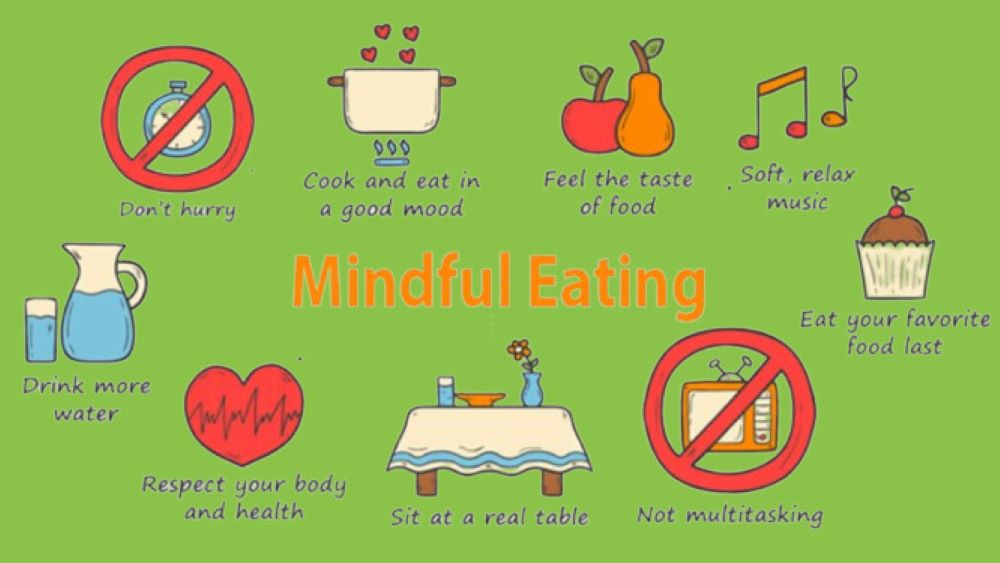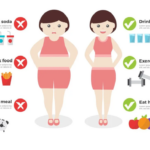The concept of mindful eating is deeply rooted in the broader ethos of mindfulness, an ancient practice that has permeated numerous religious traditions for centuries. mindful eating is so important. But in our daily lives, our friends, family, and coworkers may not be patient enough to eat with us since they take five minutes for each meal.
So practice self-compassion and explore formal mindful eating on retreats and special occasions, as well as casual mindful eating in everyday life.
What I want to propose is more mindful eating, possibly “informal” mindful eating rather than formal mindful eating. Especially amid the stress and excess food of the holidays, from Halloween to New Year’s, we are more prone to consume mindlessly than mindfully. Here are six benefit and eight basic suggestions to help us distinguish between thoughtless and (more) mindful eating and reconnect our bodies and thoughts.
Table of Contents
What exactly is Mindful Eating?

Mindful eating is the discipline of paying complete attention to your food, moods, hunger, and satiety indicators. It is about eating mindfully, using all of your senses, and observing your responses, feelings, and bodily signs like hunger or fullness.
Incorporating mindful eating habits into our everyday lives entails more than just a balanced diet, eating slowly or choosing healthier meals; it also entails cultivating a more personal and conscious relationship with our food. We may increase our well-being and happiness by learning to eat slowly and more mindfully. But why should I eat mindfully?
The answer is that mindful eating has some interesting benefits. The most important mindful eating benefit are:
What are the Mindful Eating Benefits?
1.Weight Loss

Studies mention that Mindful eating supports recognizing fullness cues, making intentional food choices, and reducing unconscious eating habits, all of which can contribute to weight management. By fostering awareness around eating habits, mindful eating can lead to weight loss and promote a healthier body weight. Research indicates that practicing mindful eating may facilitate weight loss and weight maintenance without the need for calorie counting.
2. Improved awareness of hunger and fullness
John Hopkins Medicine demonstrates that mindful eating increases the awareness of hunger and fullness. By adhering to the principles of mindful eating and eliminating distractions, you become attuned to your body’s hunger and fullness signals. Taking time to eat allows your stomach to communicate when it’s satisfied, preventing overeating. As you slow down and pay attention to your food, you’ll discern between genuine hunger and emotional triggers, avoiding eating merely out of habit or convenience.
Hunger may manifest as irritability, fatigue, and stomach rumbling, while fullness cues may include reduced enjoyment of food, a comfortably full sensation with slight pressure, and diminished hunger pangs.
2. Enhanced digestion

Stress levels can significantly impact digestive conditions like Irritable Bowel Syndrome (IBS). Studies indicate that practicing mindful eating can potentially alleviate digestive issues by mitigating stress, curbing overeating tendencies, and promoting a slower pace of eating.
3. Mindful eating reduces stress

Cortisol, often referred to as the stress hormone, plays a crucial role in the body’s “Fight-Or-Flight” response. Elevated stress levels are often accompanied by high cortisol levels. Studies propose that mindfulness practices, such as mindful eating, can effectively lower cortisol levels, aiding in stress reduction.
4. Decreased overeating and binge eating
Mindful eating offers a structured approach for individuals to pause during meals and connect with their inner state. This pause interrupts the pattern of overeating and binge eating by encouraging individuals to slow down and assess their needs.
Studies demonstrate that mindful eating is effective in diminishing binge eating and emotional eating behaviors. This correlation may stem from the beneficial impact of mindfulness practices on alleviating anxiety and depression.
5. Making healthier food choices
Increased awareness of how food affects your body can lead to selecting more nourishing options. Practicing mindful eating fosters self-compassion, diminishing tendencies toward emotional eating and directing attention to foods that promote vitality. Consequently, rather than experiencing feelings of excessive fullness, bloating, and lethargy after meals, you’re inclined to opt for foods that leave you feeling rejuvenated and revitalized.
6. Improved food satisfaction
Engaging in mindful eating promotes a deeper connection with your meals compared to when distractions abound. Studies indicate that mindful eating enhances your recognition of satisfaction signals. This heightened awareness may gradually diminish overeating tendencies while ensuring you feel thoroughly satisfied after each meal, facilitating the maintenance of a well-rounded diet.
8 Ways to Implement Mindful Eating

Mindful eating helps people make healthier food choices and create habits that enhance both their physical and emotional health. Here are six mindful eating techniques to help you start eating mindfully:
1. Eat in slow rhythm
Keep engaging in leisurely eating while conversing with your dining partners, remaining attentive to the cues of satiety your body provides. When dining solo, strive to remain fully present in the moment of savoring each bite.
2. Feel the meal ingredients
With mindful eating, take a bite and observe the sensations in your mouth. Explore the texture and attempt to discern each ingredient and flavor. Chew deliberately, paying attention to the process and the sensations it evokes.
3. Allow your body to catch up with your head.
Eating swiftly after you’re full and rejecting your body’s signals, as opposed to slowing down and quitting when your body indicates it’s satisfied.
Slowing down is one of the most effective strategies to encourage our minds and bodies to express what we require for nourishment. The body transmits its satiation signal around 20 minutes after the brain, which is why we frequently subconsciously overeat.
Slowing down allows your body to catch up with your brain and hear the messages. Simple methods to slow down could include adopting many of your grandmother’s customs, such as sitting down to eat, chewing each meal 25 times (or more), placing your fork down between bites, and all those ancient manners that may not be as meaningless as they appear.
Consider how you might slow down your eating and pay closer attention to your body’s cues.
4. Recognize your body’s unique hunger cues
Are you responding to an emotional desire or your body’s needs?
We often listen to our heads first, but like with many mindfulness activities, leaning into our bodies first may lead to greater understanding. Rather than just eating when we get emotional cues, which may differ for each of us and include stress, unhappiness, irritation, loneliness, or even boredom, we may listen to our bodies.
Do you have a rumbling stomach, poor energy, or a sense of lightheadedness? Too frequently, we eat according to our minds rather than our bodies. True mindful eating involves paying close attention to our bodies’ hunger cues.
Ask yourself:What are my body’s hunger signals?


What are your mental hunger triggers?
5. Create a mindful kitchen to promote mindful eating.

Another way we eat mindlessly is by strolling around looking into cupboards and eating at odd times and locations, rather than planning ahead of time for our meals and snacks. This slows us down, for starters, but it also inhibits us from acquiring good environmental signals about what and how much to eat, as well as wiring our brains for new, less-than-ideal eating cues.
Do you want to develop a habit of eating every time you get in the car or other situations?
Sure, we all nibble from time to time, but eating at predictable times and places may improve both your mental and physical health, as well as your mood and sleep routine. Yes, that includes sitting down (at a table!), putting food on a plate or dish rather than eating it directly from the container, and using utensils rather than our hands.
It also helps to dine with others since you are not only sharing and making good connections, but you are also slowing down and enjoying the food and conversation more, and we follow our signals from our dining companion rather than overeating or undereating due to emotion.
Having a conscious kitchen entails planning and caring for your cooking environment to promote healthy eating and nourishing gatherings. Think about what you bring into your kitchen and where you put things away. Are healthy foods convenient? What types of foods are in sight? When food is available, we consume it.
There are several reasons why raisin eating is such an effective practice, one of which is that when we slow down and consume good meals like raisins, we frequently appreciate them more than the tales we tell ourselves about healthy foods.
You don’t have to plan your meals down to the last mouthful, and it’s vital to be adaptable, especially on special occasions, but be aware that your eating habits may change depending on the season or the occasion. When you prepare ahead of time, you are more likely to consume what your body requires at the time rather than undereating and indulging later, or overeating and regretting it later.
The usual recommendation is to avoid shopping while hungry, but the middle way also applies here. A psychological phenomenon known as “moral licensing” has demonstrated that buyers who buy kale are more likely to visit the booze or ice cream department than those who do not. We appear to believe that our karma will balance out and that we may “spend” it on junk food or other undesirable actions.
6. Understand your motives.
Eating emotionally satisfying foods versus eating nutritionally nutritious foods.
This is another difficult balance to strike, and ideally, we can choose foods that are both nutritious and soothing. But think about that first conscious raisin. Did you find that appealing before you tried it? There are several reasons why raisin eating is such an effective practice, one of which is that when we slow down and consume good meals like raisins, we frequently appreciate them more than the tales we tell ourselves about healthy foods.
As we practice eating healthier and a wider range of meals, we become less likely to binge on our comfort foods and more likely to appreciate healthy foods, eventually finding many foods psychologically and physically gratifying rather than just a few.
7. Develop a deeper connection with your food.

Consider where food originates from rather than thinking of it as an end product.
Unless you are a hunter-gatherer or a subsistence farmer, we have all become increasingly distant from our food in recent years. Many of us don’t think about where a meal originates from beyond the shop box. This is unfortunate since eating provides a great chance to link us more profoundly to the natural world, the elements, and one another.
When we take a moment to consider everyone involved in the meal that has arrived on your plate, from the loved ones (and yourself) who prepared it to those who stocked the shelves, to those who planted and harvested the raw ingredients, to those who supported them, it is difficult not to feel grateful and connected.
As you sit down to consume your meal, keep in mind the water, soil, and other factors that contributed to its production. You might think about the cultural traditions that gave you this meal, the recipes kindly given by friends, or brought from a faraway place and time to be passed down through the family.
When you consider everything that went into the meal, it becomes easy to feel and express gratitude to all of the people who gave their time and effort, the elements of the universe who contributed their share, our friends or ancestors who shared recipes, and even the beings who may have given their lives to help create this meal.
With a little more consciousness like this, we may be able to make better choices regarding sustainability and health in our food, not only for ourselves, but for the entire world.
8. Focus on your plate.
Distracted eating versus attentive eating.
Multitasking while eating is a formula for being unable to fully listen to our bodies’ demands and desires. We’ve all been to the movies with our bags full of popcorn, and before the show is done, we’re wondering who ate all of our popcorn. When we are preoccupied, it is difficult to listen to our bodies’ cues regarding food and other demands.
With your next meal, try single-tasking and just eating, with no screens or distractions other than enjoying the folks you’re having a meal and conversation with.
So, while formal mindful eating practices may come to mind when we think of a mindfulness training or retreat we attended, the fact is that we live and eat in the real world, which is hectic.
However, we may apply the insights learned from our formal practice- slowing down, listening to our body, doing one item at a time, creating tiny rituals, and examining everything that went into our meal on a more frequent basis- to bring more informal mindfulness to our everyday meals.
Complete your mindful eating journey with functional fitness to get the most of health benefits.
Bottom line
Thank you for taking the time to read through this blog post on mindful eating. Your commitment to learning about this practice shows a genuine interest in improving your relationship with food and overall well-being.
As we’ve discussed, mindful eating is not just about what you eat, but also how you eat. By bringing awareness to your eating habits, you can cultivate a deeper connection with your body’s hunger and fullness cues, make more conscious food choices, and ultimately enjoy a more satisfying and nourishing eating experience.
In today’s fast-paced world, it’s easy to fall into the trap of mindless eating, rushing through meals without truly savoring the flavors or listening to our bodies. However, by incorporating mindful eating into your daily routine, you can break free from this cycle and rediscover the joy of eating.
Remember, mindful eating is not about perfection but progress. Start small, and gradually incorporate mindful eating practices into your meals. With time and practice, you’ll likely notice improvements in your digestion, stress levels, and overall relationship with food.
So, here’s to embracing mindful eating and all the benefits it brings to our lives. Cheers to nourishing our bodies, minds, and souls one mindful bite at a time!
FAQs
What exactly is mindful eating, and how does it differ from regular eating?

Mindful eating is about bringing awareness and attention to the experience of eating. It involves being fully present and engaged with your food, noticing the flavors, textures, and sensations with each bite. Unlike regular eating, which often involves distractions like TV or phones, mindful eating encourages you to savor the moment and listen to your body’s hunger and fullness cues.
How can mindful eating help me with weight management?

Mindful eating can be a powerful tool for weight management because it helps you develop a healthier relationship with food. By paying attention to your body’s signals of hunger and fullness, you’re less likely to overeat or indulge in emotional eating. Additionally, being more mindful of what you eat may lead you to make healthier food choices, which can support your weight goals in the long run.
I’m always in a rush and don’t have time to eat slowly. Can I still practice mindful eating?

Absolutely! Mindful eating is more about your mindset than the speed of eating. While it’s ideal to eat slowly and savor each bite, you can still practice mindfulness even if you’re pressed for time. Simply take a moment to check in with yourself before eating, notice the sensations of hunger and fullness, and try to focus on your food as much as possible, even if you have to eat quickly.
I struggle with emotional eating. Can mindful eating help me break this habit?

Yes, mindful eating can be a helpful tool for overcoming emotional eating. By becoming more aware of your emotions and the triggers that lead you to eat, you can develop healthier coping mechanisms and make more conscious choices about when and what to eat. Mindfulness practices such as deep breathing or meditation can also help you manage stress and emotions without turning to food for comfort. Remember, breaking habits takes time and patience, so be gentle with yourself along the way.











